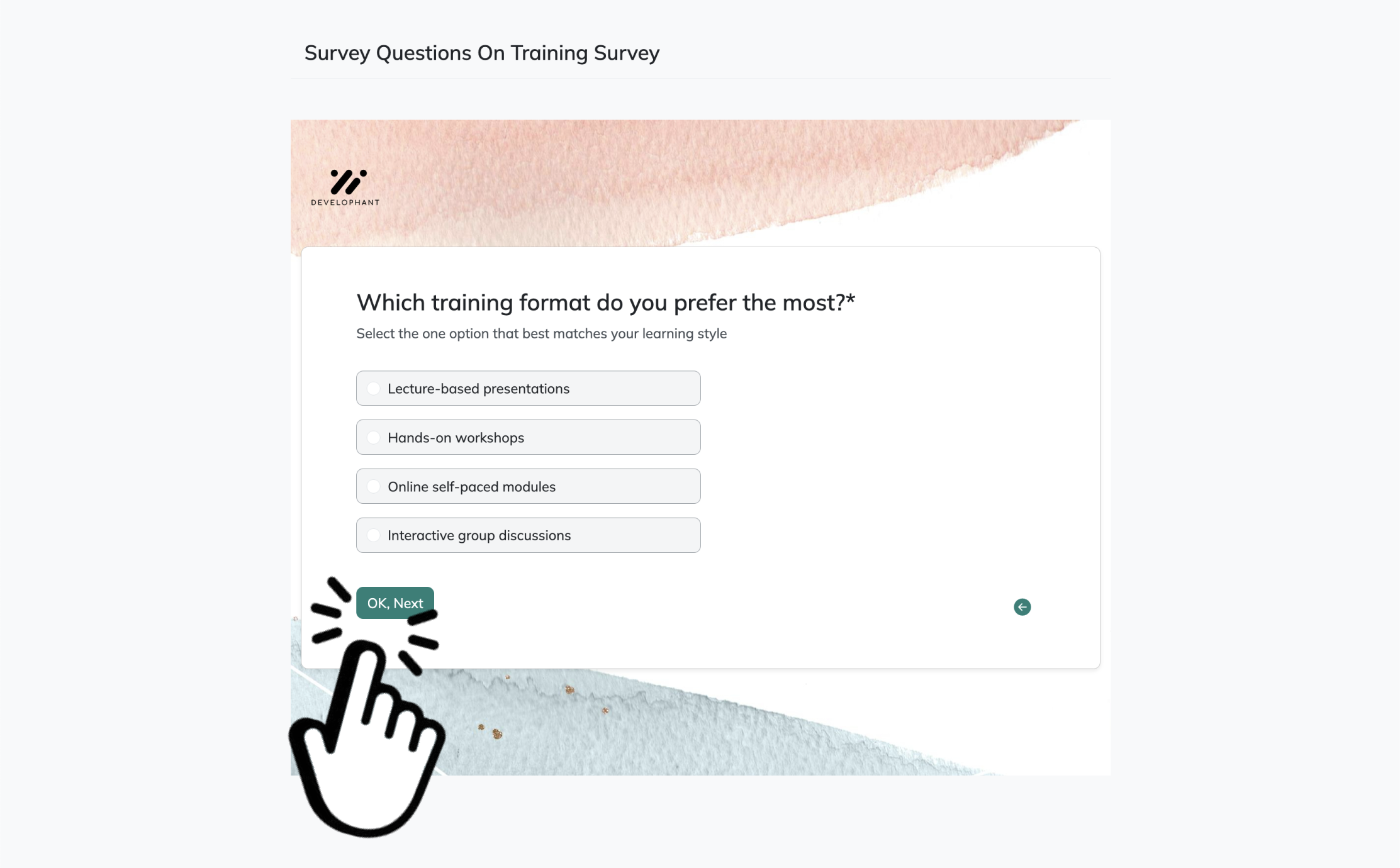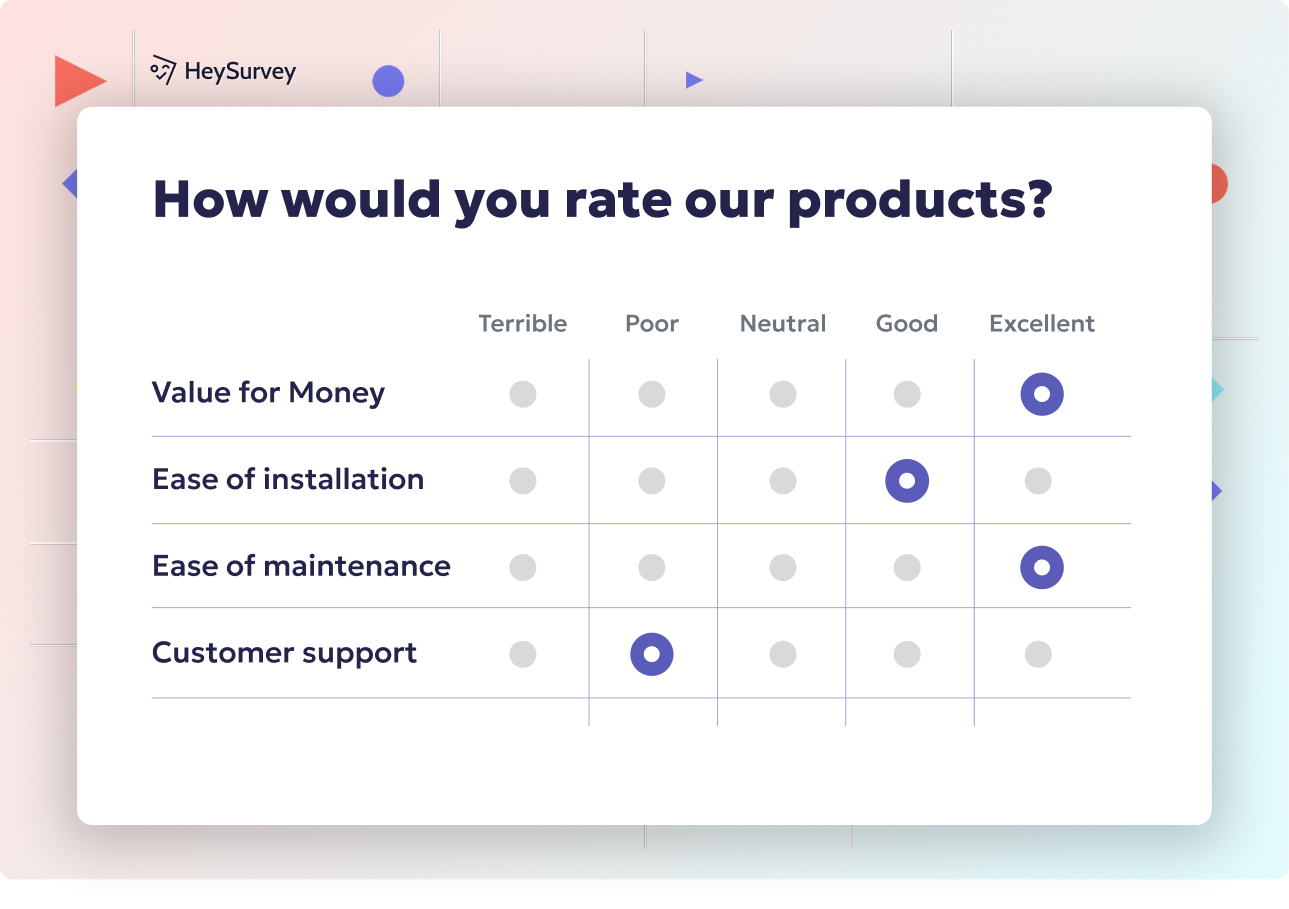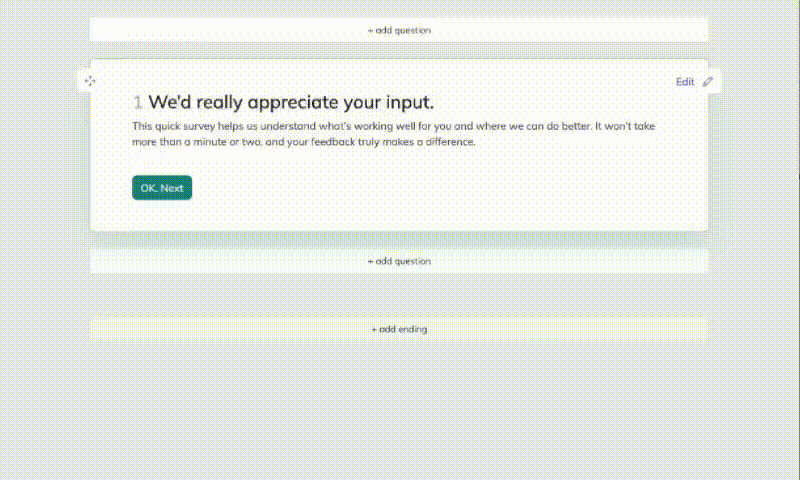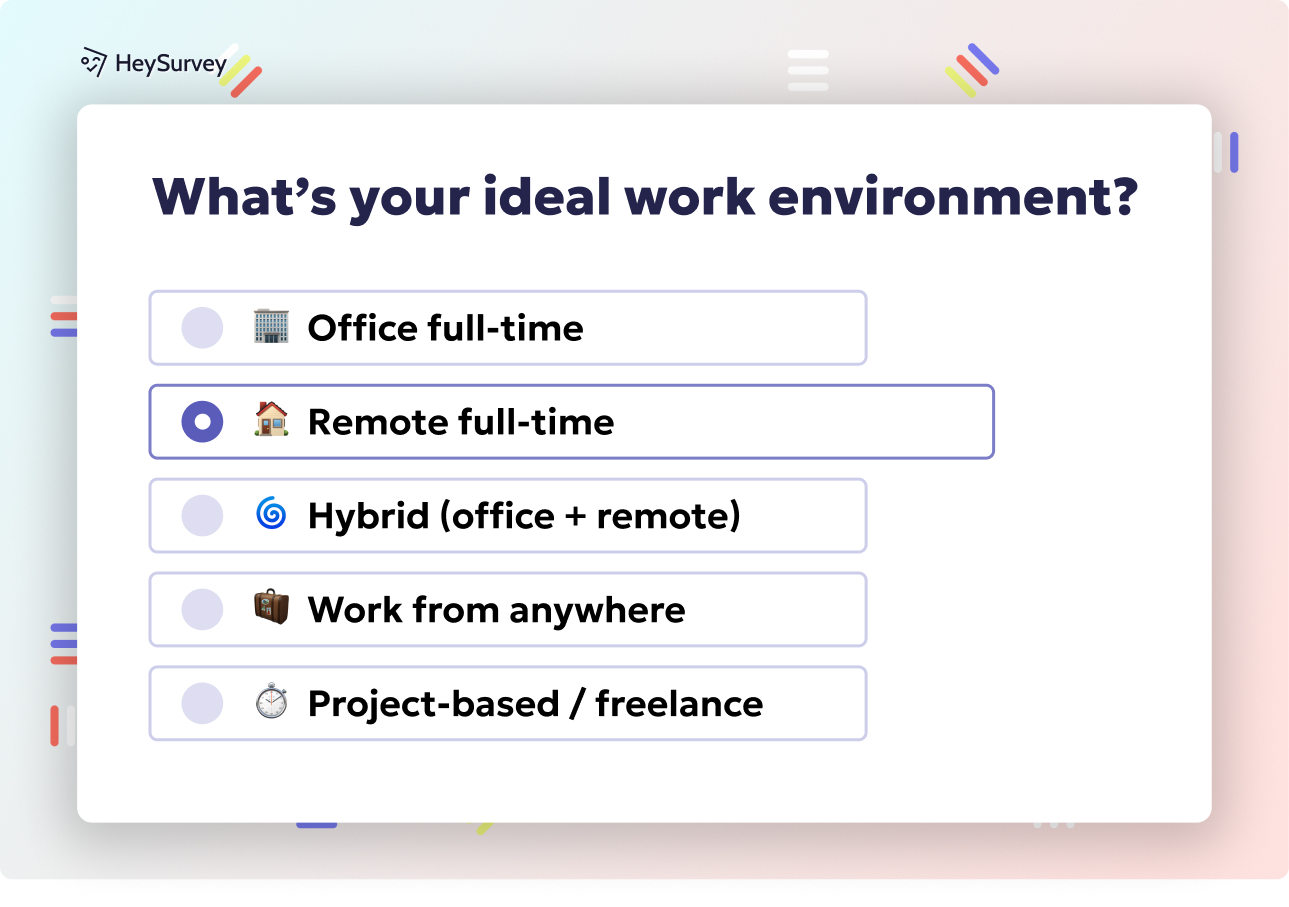28 Retreat Feedback Survey Questions to Improve Your Next Event
Discover 25 retreat feedback survey questions to evaluate your event’s success and boost future retreats. Get the best sample question ideas!
When you want to run truly memorable retreats, capturing authentic retreat responses is pure gold.
Retreat feedback survey questions are your secret window into the participant experience.
A simple, generic post-event form will never give you the rich retreat insights you actually crave.
Instead, you can layer multiple targeted surveys before, during, and after your retreat to watch the full story unfold in real time.
On top of that, you’ll discover the most effective survey types, learn exactly when to use them, and see sample retreat questions for every phase.
Get ready, because you’re about to unpack six focused feedback surveys, each with practical tips, sample questions, and a punchy best practices round-off that even your future self will thank you for. If you’re looking for an easy way to implement these strategies, try an online survey tool to streamline your feedback process.
Pre-Retreat Expectation Survey
The Power of Early Insight
Bold Key Phrase: Aligning on pre-retreat feedback questions sparks clarity.
Picture this: two weeks before your big retreat, attendees get a short survey and the energy starts to build in a focused way, not in a cloud of guesswork.
This is where you discover what drives each participant, their personal goals, secret anxieties, and the outcomes they really want from your time together.
Pre-retreat expectation surveys are your first step toward better agenda design.
Plus, they quietly set the stage for richer, more meaningful retreat responses later on.
By inviting frank input well before check-in, you signal that their voice matters before, during, and long after the retreat, which already feels like a win.
You can align sessions with what actually fires up your group.
You’ll identify if some are anxious about networking or logistics.
You boost attendance and engagement, since people see their input shaping the experience.
Why & When to Use
Bold Key Phrase: Timing your survey right makes your retreat planning sharper and easier.
Run this survey 2,4 weeks before the retreat.
Share via email, Slack, or your regular team comms.
Aim for fresh responses, with enough lead time to adjust your plan but close enough that the retreat feels top-of-mind.
Plus, the sooner you start gathering these retreat responses, the more tailored and relevant your schedule becomes.
Here’s the thing, if you want retreat feedback survey questions answered honestly, keep the tone warm, the questions open, and the vibe “friendly human,” not “formal questionnaire from outer space.”
Sample Questions
Bold Key Phrase: Targeted questions turn vague interest into specific, useful insights.
What is your primary goal for attending this retreat?
Which topics or areas would you love to see covered during the retreat sessions?
Are there any specific skills or experiences you want to walk away with?
Do you have any anxieties or concerns about attending the retreat?
What sort of team bonding activities interest you most?
How would you define a successful retreat personally?
What do you hope to learn from colleagues during our time together?
By tuning into these pre-retreat feedback questions, you make the agenda a custom fit for your group and set a playful “we listen” vibe for everything that follows.
Pre-event (pre-retreat) surveys sent several weeks before an event significantly enhance engagement by aligning content with participants’ expectations and driving tailored agenda design [https://events.studio/essential-event-surveys-timing/]

How to Create a Survey in HeySurvey: Quick Start Guide
Ready to create your survey with HeySurvey? Follow these three easy steps – and explore bonus tips to make your survey stand out! If you’re looking for an online survey maker that’s free and easy to use, HeySurvey is a great choice.
1. Create a New Survey
Click the Start from Template button below to open a ready-to-edit survey template tailored to your needs. If you prefer, you can also start from scratch or try typing out your questions directly. No account is needed to begin – you can explore freely! When you’re ready to save, publish, or view results, you'll need to sign up or log in.
2. Add and Customize Questions
You’ll be taken to the intuitive Survey Editor. Here, click Add Question to build your survey. HeySurvey offers a variety of question types, such as multiple choice, scales (including NPS), open-text, file upload, dropdowns, and more. To make your questions engaging, add descriptions, mark required questions, and insert images (from your computer or choose from Giphy/Unsplash libraries). Use drag-and-drop to reorder questions and duplicate them for faster setup. For advanced customization, add branching to direct respondents down different paths based on their answers.
3. Publish and Share Your Survey
When your survey is ready, use the Preview button to see exactly what your respondents will experience. Adjust the appearance in real-time via the Designer Sidebar if needed. Once satisfied, click Publish. HeySurvey will provide you with a shareable link and embed code. Remember: you’ll need to create an account to publish and receive results.
Bonus Steps:
- Apply Branding: Upload your own logo and adjust colors, fonts, and background images via the Designer Sidebar.
- Define Settings: Set survey open/close dates, response limits, redirect URLs, and choose whether to let participants view summarized results.
- Advanced Logic: Use branching to skip respondents to different questions or endings, creating a personalized survey flow.
That’s it! Click below to get started and build your perfect survey now.
On-Site Pulse Check Survey
Real-Time Pulse for Maximum Insight
Bold Key Phrase: Real-time retreat responses keep your event agile and attendee-focused.
Here’s the thing: Magic happens at retreats, but sometimes you get a few headaches mixed in.
Micro-surveys during the event are your chance to course-correct fast so you can rescue the vibe before it slips.
Pulse check wetreat questions stay light, do not eat into networking time, and help you fix little issues before they become legends of retreat lore.
By checking in daily or after Day 1 sessions, you turn grumbles into “wow, they actually care!” moments.
On-site pulse check surveys pick up on vibes you simply cannot see from the podium.
They let planners tackle issues immediately, like clunky A/V or drifting content.
Short surveys mean higher completion rates, which leads to better data.
For more ideas on feedback formats, see these event planning survey questions.
Why & When to Use
Bold Key Phrase: Smart timing and easy access are what make pulse surveys actually work.
Send surveys after Day 1, nightly, or during extended breaks.
Use a mobile app, text, or a QR code for hassle-free access.
Keep surveys to 3 minutes or less, since brevity boosts honest retreat feedback survey questions responses.
Plus, always keep your Likert scales consistent (1,5, agree,disagree), so your same-day analysis feels more like a quick check than a statistics exam.
Sample Questions
Bold Key Phrase: Targeted pulse questions help you adjust the retreat in real time.
How satisfied are you with today’s sessions so far?
Did you feel comfortable sharing your ideas in group activities?
What is one thing that could improve your experience for the rest of the retreat?
Was the session pace too fast, too slow, or just right?
Is there anything the organizing team can do to make you feel more included?
Which moment today felt most energizing for you?
Did you encounter any issues with the venue, food, or logistics?
On top of that, asking these punchy wetreat questions at the right time is like tuning an instrument mid-concert, so you end up with a harmony of happy, heard participants instead of a surprise drum solo of complaints.
Real-time, in-the-moment pulse surveys, such as micro surveys during events, yield more authentic, immediate feedback and significantly higher response rates through ease and immediacy (feedbackrobot.com)
Let me know if you would like more research findings or specific data points related to retreat survey design and impact.
Session-Specific Feedback Survey
Zooming in on What Matters Most
Bold Key Phrase: Session-retreat responses spotlight what truly connects.
Every retreat has its standout moments, standout speakers, and a few surprise flops that sneak in like uninvited guests. Session-specific surveys are your microscope for what works and what could use a remix.
These feedback forms dive deep into each workshop, keynote, or breakout so you can capture insights that would vanish by dinner if you waited. When you deploy survey links within 30 minutes, you keep memories fresh and make feedback as vivid as the session itself.
You’ll see which facilitators wowed and which exercises fizzled.
You uncover concrete tips for next year’s agenda.
Session tagging (like “S1: Leadership Panel”) makes reporting a dream.
Why & When to Use
Bold Key Phrase: Simple, well-timed surveys keep your insights sharp.
Drop these surveys right after each relevant session.
Go digital so you skip the paper mess and meet people where they already are, on their phones.
Keep it simple to avoid survey fatigue.
Plus, using consistent tags or codes helps you track what works across multiple sessions at a glance, like giving your data a neat little filing system that actually behaves.
Sample Questions
Bold Key Phrase: Targeted questions turn fuzzy impressions into clear direction.
Which part of this session stood out the most to you?
How clear and engaging was the facilitator’s delivery?
Did you get the actionable takeaways you expected?
Was the session content relevant to your personal goals for the retreat?
What could be improved in future versions of this session?
Did you have enough time for Q&A or group work?
Rate your overall enjoyment of this session.
On top of that, by zoning in with session-specific retreat questions, you do not just guess what succeeds; you build future agendas on hard data, one memorable speaker at a time, and maybe retire a few duds along the way.
Team-Building & Social Activities Survey
Measuring the Fun Factor and Beyond
Bold Key Phrase: Social retreat responses reveal the true culture wins.
You know those team-building photos that look amazing on Instagram, but leave you wondering if anyone actually felt closer afterward.
Here's the thing: you need to know if you built real trust or just filled the dance floor.
A social activities survey goes beyond “did you have fun?” to capture deeper retreat responses like stories, emotions, and connections that came from unstructured play.
You highlight what actually bonds your team versus what quietly bores them.
Open-ended retreat questions invite people to share little stories and inside jokes that reveal what really clicked.
This feedback shapes future retreats, so your next talent show is legendary for the right reasons, not just the wild costumes.
Checkout more event planning survey questions for additional inspiration on crafting feedback forms that get to the heart of your team’s experience.
Why & When to Use
Bold Key Phrase: Fire this out right after the fun while memories are fresh.
Send the survey immediately after major group activities to catch honest, in-the-moment reactions.
Use mobile notifications so people can tap in quick, candid input while they are still chatting about what just happened.
Focus on stories and feelings, not just scores, so you hear the “why,” not only the “what.”
On top of that, social activities feedback becomes your secret lane to boosting team spirit, one campfire tale at a time.
Sample Questions
Bold Key Phrase: Rich retreat feedback survey questions unlock real culture insights.
Which team-building activity did you enjoy the most, and why?
Did you feel closer to your colleagues after today’s group events?
Can you describe a standout moment from any social activity?
What suggestions do you have for future team-building experiences?
Did any part of the social schedule feel awkward or forced?
How did off-site or informal activities influence your overall retreat experience?
Share one new thing you learned about a teammate during our crew bonding.
Plus, when you collect retreat feedback in these moments, you do more than measure fun; you start to bottle your company magic for the next round.
A faculty retreat with challenge-course activities significantly boosted group cohesion and job satisfaction immediately post-event, though gains waned by semester’s end, highlighting the need for follow up strategies [Birx et al., 2011] [Summary source: PMID 21596358].
Logistics & Amenities Survey
Perfecting the Experience from the Ground Up
Bold Key Phrase: Excellent amenities drive memorable retreat responses.
If the meeting space is freezing or the coffee runs out, no agenda in the world can save you.
Here’s the thing: a logistics & amenities survey helps you uncover the little comforts and annoyances people rarely mention until it is too late.
By asking detailed wetreat questions about the basics like venue, meals, lodging, and accessibility, you get fix-it-fast feedback that pays off with huge returns on satisfaction next year.
Plus, you might prevent the legendary story of “that one retreat where the coffee disappeared at 10 a.m.”
You’ll learn whether transport ran smoothly or if there were mystery pillows.
Guests will tell you about meal hits and misses (nut-free cake, anyone?).
Attendees notice accessibility and comfort, sometimes more than they notice speakers.
Why & When to Use
Bold Key Phrase: Timing and simplicity make this survey actually work.
Issue this survey on the final day or in your post-retreat wrap email.
Make it easy to access and quick to complete.
Zero in on actionable retreat responses about what you can actually improve.
On top of that, remember that the basic bits often dominate wetreat questions simply because they are universal.
Sample Questions
Bold Key Phrase: Specific questions turn vague feelings into clear fixes.
How would you rate the overall comfort of the meeting and lodging spaces?
Did you have any issues with meals, snacks, or food preferences not being met?
Was transportation to and from the retreat venue convenient?
Were there adequate options for relaxation and breakout time?
Did you notice any accessibility issues (stairs, restrooms, signage)?
How satisfied were you with the quality and availability of refreshments?
What single change would most improve the basic retreat experience?
Here’s the thing: when you treat logistics as the foundation instead of an afterthought, you set yourself up for rave retreat responses and far fewer complaints in your future planning, which is a win for both you and your inbox.
Post-Retreat Overall Satisfaction Survey
The Final Word: Lasting Impact and Value
Big-picture retreat feedback drives long-term improvement.
Once everyone is home and the stories settle, it’s time for big-picture retreat questions that show what truly stuck.
You want to know if the retreat delivered on its promises and whether people changed, connected, or came back more inspired.
A post-retreat overall satisfaction survey is sent out 1,2 weeks later, long enough for real impact to sink in.
Here’s the thing, this is where you uncover insights on behavior change, knowledge retention, and yes, the infamous ROI.
You measure if original goals were met and if new ones emerged.
You see tangible shifts in team culture or ways of working.
Net Promoter Scores (NPS) help benchmark retreat response success year after year.
Why & When to Use
You time this survey to capture what truly lasts.
You’ll want to distribute this survey within 7,14 days of returning to the work grind.
Plus, you should focus on questions that tie back to initial aspirations and observable outcomes.
- Use it to track lasting changes and fine-tune next year’s plans.
The gift here is that you see your retreat through the lens of memory, after all the buzz has faded and the swag is buried in desk drawers.
Sample Questions
Great questions reveal the real legacy of your retreat.
To what extent did the retreat meet your expectations and personal goals?
What have you done differently since returning from the retreat?
Would you recommend this retreat experience to a colleague? (NPS)
Which retreat session or activity had the most lasting impact on you?
Are there new habits, skills, or relationships you’ve kept up?
What would make the next retreat more valuable for you personally?
Do you feel more connected to your team or organization as a result of this retreat?
On top of that, with smart post-retreat questions, you can chart the true legacy of your hard work and set up your next event for even bigger wins.
Best Practices: Retreat Feedback Survey Dos & Don’ts
Bold Key Phrase: Smart retreat survey habits make effective feedback thrive.
You already know the power of layered retreat feedback surveys, but without a few smart habits, your responses can dry up and your insights can end up gathering dust instead of driving change.
Here’s the thing: when you follow a few simple dos and don’ts, you make it easier for people to share, and you actually get data you can use.
Here are the essential dos for extracting the richest retreat insights:
Design surveys mobile-first so people can respond easily from anywhere, even in line for s’mores.
Blend closed (quantitative) and open (qualitative) questions to get both clear numbers and rich stories.
Automate reminders to gently nudge non-responders, without turning into that one over-eager group chat.
Anonymize sensitive retreat questions so honest feedback feels safe and drama-free.
Use clear, jargon-free language that matches your attendees’ vibe and feels natural to answer.
Tag surveys and questions for easy tracking in your reporting tools, so future-you is not stuck in spreadsheet chaos.
Mix timing by sending some surveys on-site and others post-retreat to capture how feelings shift over time.
But don’t fall into these traps:
Avoid double-barreled questions and stick to one idea per question so answers actually make sense.
Don’t over-survey, because too many forms can crush engagement and joy faster than a broken coffee machine on day one.
Steer clear of leading language like “Don’t you agree the food was fabulous?” and let people answer freely.
Never ignore the follow-up, and always close the loop with attendees on what you learned and how you will improve.
On top of that, set a smart data analysis cadence, with weekly reviews for fresh surveys and quarterly reviews for trendlines that show the big picture over time.
Plus, transparency works like magic when you share topline results, including the good, the bad, and the hilariously specific, so your group feels seen and taken seriously.
When you structure your retreat feedback survey questions thoughtfully and act on the results with care, you turn every response into a building block for your next, best getaway.
In the end, you do more than collect insights; you build loyalty, trust, and retreats so good people start asking when the next one is before this one even ends.
Dos and Don’ts: Best Practices for Crafting Retreat Feedback Surveys
You can take your feedback game from “meh” to marvelous with a few smart strategies that you can actually stick with.
Follow the retreat feedback survey template dos and don’ts and you’ll see your completion rates soar faster than you can say “last call for feedback”.
Do:
Keep every survey brief, equally mobile and desktop-friendly, and free from jargon.
Mix up closed (multiple choice, rating) and open (short answer) questions so you get both numbers and nuance.
Personalize by using participant names and you’ll see more smiles and fewer skips.
Always send reminders (but not so many that you turn into inbox spam).
Make the subject line inviting and respect time zones, because nobody loves a midnight survey surprise.
Don’t:
Never cram more than 10 questions in one survey, since survey fatigue is real and very grumpy.
Avoid using insider language or acronyms that make people feel like they missed a secret meeting.
Do not wait forever to send your survey, because the sooner you ask, the smarter your insights.
Never skip over anonymous responses, since those can be the most honest and eye opening.
Never ignore the power of a good thank-you note or a tiny reward, because appreciation can be wildly motivating.
To boost response rates:
Offer a perk (raffle entry, eBook, discount on a future retreat) since people love a little treat almost as much as a beach view.
Use friendly, clear, “open me now!” subject lines that feel like a personal nudge, not a chore.
Schedule sends to match your attendees’ time zones for a better chance they are in the right mood when your survey arrives.
When you analyze:
Segment answers by first-timers vs. returners to tailor future invites that feel like they were designed just for them.
Compare pre retreat survey questions to post-retreat insights to see where dreams and reality met or missed.
Visualize trends in colorful dashboards so your team can spot victories and opportunities at a glance without squinting at spreadsheets.
If you want to know how to measure retreat success, here is the thing.
Thoughtful questions, a friendly tone, and a little playful curiosity turn your feedback into a roadmap for your next hit retreat.
With the right retreat feedback survey questions for every step of the journey, you can transform retreats from pleasant escapes to powerhouse experiences that spark real change.
On top of that, it is all about listening, tweaking, and showing guests they matter before, during, and long after the retreat is done, which is how you quietly build loyalty and a little bit of magic.
Related Event Survey Surveys

30 Conference Survey Questions to Improve Your Event Feedback
Explore 30+ expert conference survey questions to gather valuable event feedback and boost attend...

32 Event Planning Survey Questions: Types, Timing & Templates
Discover 35+ event planning survey questions with proven templates for pre, during, and post-even...

31 Family Reunion Survey Questions & Questionnaire Guide
Discover 29 expert family reunion survey questions & questionnaire tips to simplify planning, act...
